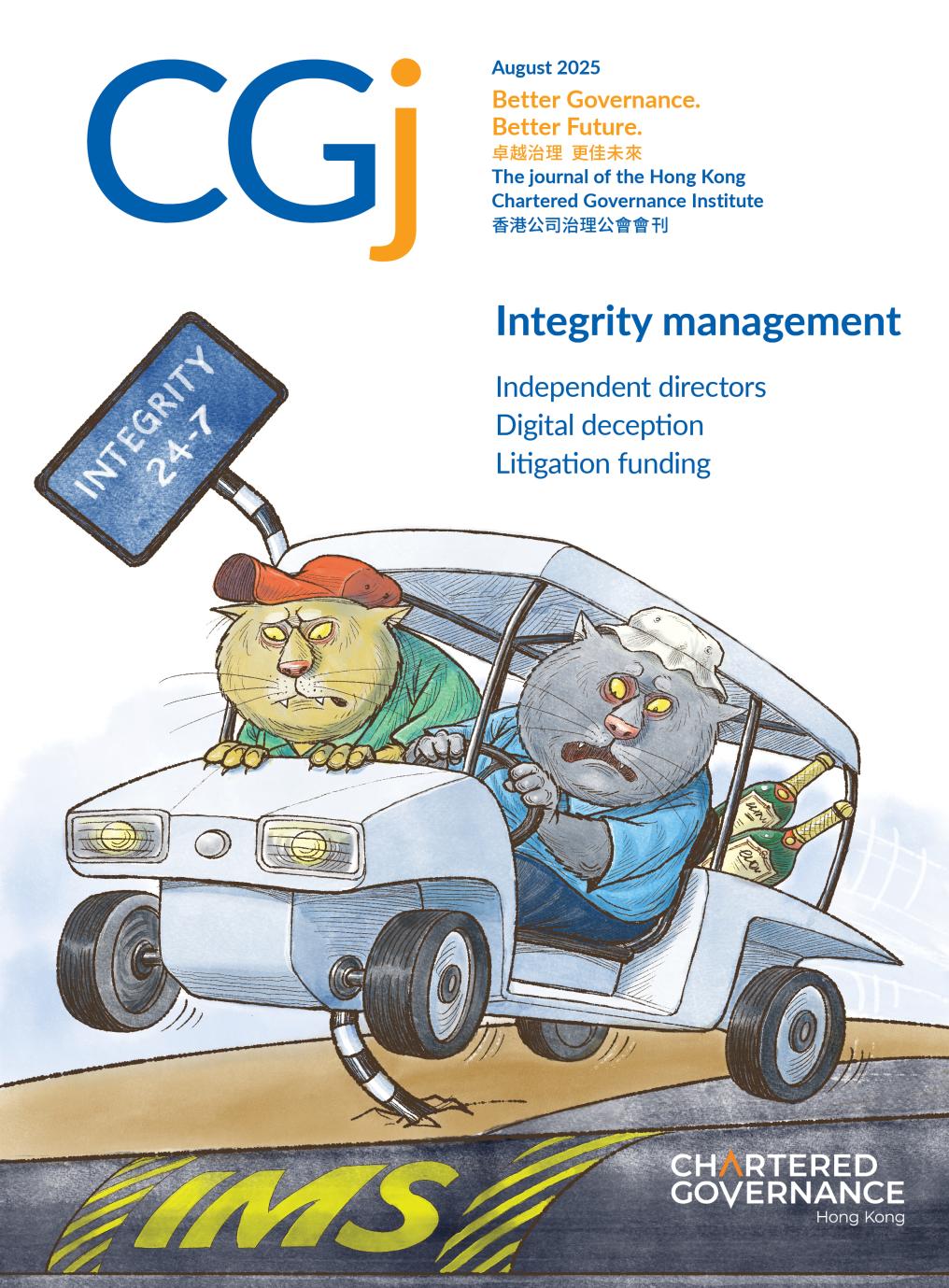
What integrity management means for governance professionals
In today’s complex business environment, integrity management is a vital pillar of corporate governance. Four senior leaders of the Institute talk to CGj about how to translate integrity management principles into practice.
Highlights
- Institute leaders highlight the growing urgency of embedding integrity throughout organisational culture and governance systems, not just as a symbolic gesture but as a functional strategy
- whether integrity oversight is housed in a dedicated committee or incorporated into existing committees, the board must set expectations and reinforce them with action
- from drafting codes of conduct to managing director induction and overseeing whistleblower protection, governance professionals are on the front lines of integrity implementation
While business ethics has long been recognised as a cornerstone of good governance, integrity management is emerging as a distinct and more focused approach to embedding ethical principles throughout an organisation.
‘Ensuring good business ethics has always been a foundational element of good governance,’ says David Simmonds FCG HKFCG, Institute President, and Chief Strategy, Sustainability and Governance Officer, CLP Holdings Ltd. ‘Integrity management is about the way this objective can be achieved in the most effective manner.’
This is also the approach taken by Edith Shih FCG(CS, CGP) HKFCG(CS, CGP)(PE), Honorary Adviser to Council, Past International President and Institute Past President, and Executive Director and Company Secretary, CK Hutchison Holdings Ltd. She points out that, while the term may be relatively new, the concepts it encompasses are not. ‘At its core, integrity management includes anticorruption efforts, proper handling of conflicts of interest, upholding high ethical standards at all levels and promoting overall integrity,’ she notes. ‘These are part and parcel of sound business ethics and good governance.’
Gill Meller FCG HKFCG(PE), International Vice President and Institute Past President, and Legal and Governance Director, MTR Corporation Ltd, offers a nuanced distinction between the closely related concepts of ethics and integrity. ‘Ethics is more of a decisionmaking framework, while integrity is more personal and behavioural, focusing on honesty and consistent adherence to that ethical framework,’ she says.
In an era where organisations are facing increasing stakeholder expectations and scrutiny, Ernest Lee FCG HKFCG(PE), Institute Past President, and Technical Partner, Deloitte China, believes the need for a more strategic approach to ethics is pressing. ‘Integrity management is not new, but it has become more important,’ he says. ‘Given the everincreasing complexity of the business environment, the potential conflicts of interest and the intensified expectations of stakeholders about ethical standards of organisations, there is an even stronger demand for a more structured and strategic approach to ensuring ethical behaviour, as well as for implementing more potent anti-corruption measures within organisations. Integrity management is an essential element of such an approach.’
Principles and practice
When asked what a strong integrity management framework should include, all four leaders emphasise the role of leadership.
‘The tone from the top is paramount,’ Mr Simmonds asserts. ‘You can have the world’s best practice policies, but if there’s no commitment from the top, they’re just words on paper.’ He advocates embedding ethical standards into an organisation’s value framework, covering its purpose, vision, mission and core values, supported by governance policies that translate those values into daily practice.
you can have the world’s best practice policies, but if there’s no commitment from the top, they’re just words on paper
David Simmonds FCG HKFCG
Institute President, and Chief Strategy, Sustainability and Governance Officer, CLP Holdings Ltd
Ms Shih outlines six key components of an effective integrity management framework, as follows:
- a board that sets the tone and prioritises integrity
- a well-defined code of conduct
- integration of ethics into risk management and internal controls
- ongoing training and communication
- robust enforcement, including monitoring, investigation and whistleblower protection, and
- regular reviews and updates to ensure relevance.
Ms Shih adds that transparency is vital. ‘Integrity policies and documents should be easily accessible to both internal and external stakeholders.’
For Ms Meller, a successful integrity management framework must balance ‘hard’ and ‘soft’ controls. ‘You need both procedures, along with relevant training, but also the right culture and performance management system that ensures the right behaviours are measured and rewarded,’ Ms Meller says.
Mr Lee agrees, adding that an indispensable component of the framework is having a clear code of conduct that articulates the expectations for behaviour and how ethics and integrity can be effectively built into decisionmaking. Mr Lee further emphasises that implementation is just as important as drafting. ‘A clear code of conduct alone is not enough – its successful implementation depends on the unwavering support of the board to ensure that the expected ethical culture and behaviour is firmly implanted throughout the day-to-day operations,’ he says.
a clear code of conduct alone is not enough – its successful implementation depends on the unwavering support of the board to ensure that the expected ethical culture and behaviour is firmly implanted throughout the day-to-day operations
Ernest Lee FCG HKFCG(PE)
Institute Past President, and Technical Partner, Deloitte China
Code of conduct, conflicts of interest and whistleblower protection
A clear and regularly updated code of conduct is fundamental to an effective integrity management system and it should cover such highpriority issues as conflicts of interest and whistleblower protection. ‘These are critical elements, and they should be reinforced through regular staff training and strong leadership involvement,’ says Mr Simmonds.
In terms of conflicts of interest, Ms Shih stresses that clarity, accountability and accessibility are the foundation of any effective policy. ‘The policy should contain practical examples and clearly set out expected behaviours,’ she says. This is also the approach taken by Ms Meller. She notes that training in this area needs to go beyond theoretical definitions of conflicts of interest and that organisations should use case studies to demonstrate how the principles apply in practice.
Mr Lee adds that in complex business environments, conflicts of interest can take many forms and arise at different times. ‘There could be temptations to compromise ethical standards to achieve personal or professional goals, such as ignoring safety regulations or the need to maintain quality in a bid to meet deadlines, as we’ve seen in a number of documented compliance breaches.’
When it comes to whistleblowing, Ms Shih emphasises that employees need to be assured that investigations will be conducted fairly and transparently. In addition, whistleblowers should be able to take comfort in the express understanding that there will be no punitive consequences.
Mr Lee warns that policy alone is insufficient if employees fear retaliation. ‘Many organisations have whistleblower policies, but people worry about confidentiality and retaliation,’ he says. ‘A robust framework for reporting misconduct should include adequate safeguards to encourage transparency without fear.’ He adds that board-level commitment is crucial here too. ‘Boards must ensure a workplace free from retaliation and this might include a retaliation-monitoring programme to protect whistleblowers.’
The importance of a clear integrity framework and training
Among the core pillars of good governance – accountability, transparency and integrity – it is integrity that remains the most elusive to define and measure.
‘Accountability refers to accepting responsibility, whereas transparency relates to access to information,’ explains Ms Shih. ‘As for integrity, it is more difficult to quantify or define because it is less concrete. That’s why there is very little consensus on what it means. But that does not make it any less important.’ This lack of consensus is precisely why organisations should establish clear codes of conduct and foster an ethical culture through strong leadership.
Ms Meller adds that, however the concept of integrity is defined, its presence or absence is easy to identify. ‘It’s fairly easy to recognise high and low levels of integrity in people’s actions and behaviours,’ she says.
All four interviewees concur that any ambiguity in definition reinforces the need for stronger ethical leadership, as well as clearer frameworks and better training. Mr Lee points out that, while the management of integrity issues will often involve subjective judgements, its role as a cornerstone of governance and sustainable growth remains undiminished. ‘Integrity management should be a greater focus in the initial training, as well as in the continuing professional development (CPD) of governance professionals and directors,’ he says. ‘This will help build a strong ethical culture and a common understanding of integrity in practice.’
Mr Simmonds agrees, adding that CPD training should include real-world case studies. ‘It would be helpful to ensure governance professionals are up to date on best practice and to learn from examples where integrity management systems have failed.’
The role of the board
Another area of agreement between our interviewees for this article is the need for integrity management to be a board-level concern. The board of directors needs to play a visible role in setting the appropriate tone, but it also needs to ensure that integrity is not merely aspirational but operational.
‘While detailed oversight of integrity management can be delegated to committees such as the audit and risk committees, the primary responsibility always rests with the full board. The values underlying integrity management and the efforts required to uphold integrity should be prioritised at board level,’ says Mr Simmonds.
Ms Shih adds that integrity governance from the top facilitates both the mitigation of legal risks and the safeguarding of corporate reputation. ‘The board, as the governing body, must lead by example and must set the tone from the top. By overseeing integrity management, the board ensures that it – as well as management – is accountable for upholding ethical standards,’ she says.
by overseeing integrity management, the board ensures that it – as well as management – is accountable for upholding ethical standards
Edith Shih FCG(CS, CGP) HKFCG(CS, CGP)(PE)
Honorary Adviser to Council, Past International President and Institute Past President, and Executive Director and Company Secretary, CK Hutchison Holdings Ltd
Ms Meller adds that integrity is central to long-term organisational sustainability. ‘It’s a key part of an organisation’s values and culture, which must align with its purpose and strategy. Failing to actively practise integrity presents actual legal, regulatory and reputational risks.’
failing to actively practise integrity presents actual legal, regulatory and reputational risks
Gill Meller FCG HKFCG(PE)
International Vice President and Institute Past President, and Legal and Governance Director, MTR Corporation Ltd
There were differing views, however, on whether organisations should create a specific committee dedicated to monitoring integrity initiatives. Ms Shih pointed out that whether a dedicated committee is needed or not depends on an organisation’s size, risk profile and structure. Mr Simmonds adds that, while integrity management should be the responsibility of all directors, its day-to-day oversight can be integrated into existing committees.
Mr Lee believes that setting up a dedicated integrity management committee could be useful, but only if it is independent, impartial and free from conflicts of interest, with clear terms of reference and authority.
The role of the governance professional
Governance professionals play a central role in embedding integrity into corporate culture and one of the primary ways they do this is via their director induction and board support work.
Ms Shih notes that many companies already integrate integrity-related content into their existing director orientation materials, with governance professionals playing a decisive role in developing and presenting these. ‘Governance professionals in many companies, such as my own, provide comprehensive orientation packages for new directors,’ she says. ‘These cover essential integrity topics such as bribery prevention, conflicts of interest and ethical conduct. These materials are presented to the directors by senior executives in the form of a detailed induction to governance practice.’
Ms Meller adds that integrity should also be addressed in legal briefings for incoming directors, particularly in relation to their duties and responsibilities.
Beyond director inductions, governance professionals have an ongoing role in ensuring that leadership behaviour aligns with the desired organisational culture. While this may seem a daunting task, all four of our interviewees see this as a central value brought to organisations by governance professionals.
‘Governance is fundamentally about how we regulate human behaviours and make effective trade-offs between competing priorities,’ says Mr Simmonds. ‘That can only be done with an understanding of culture and leadership drivers.’
For Ms Meller, this is where governance professionals come into their own. ‘The tone from the top is critical for most aspects of governance and governance professionals are well placed to manage that complexity.’
Integrating integrity
Hong Kong’s Banking Industry Integrity Charter, launched by the Independent Commission Against Corruption (ICAC) in collaboration with the Hong Kong Monetary Authority and the Hong Kong Association of Banks, articulates core principles that resonate far beyond the financial sector – and our four interviewees agree that this initiative offers valuable insights that governance professionals in all industries can build upon.
‘Even though the Charter targets the banking sector, many of its principles can be applied broadly,’ says Ms Shih. ‘Promoting an ethical culture, establishing a clear code of conduct and providing adequate training are exemplary practices universal to companies in all industries.’
Ms Shih adds that these are areas where governance professionals already play a cardinal role and that the Institute’s members have long implemented similar policies in their organisations. ‘The annual integrity training that the ICAC provides to integrity officers of banks would be helpful if extended to governance professionals, who perform similar duties,’ she says.
Ms Meller echoes the value of the initiative. ‘A charter can be helpful as it raises awareness and sets clear expectations, albeit on a voluntary basis.’
One of the most compelling elements of the ICAC initiative is the recommendation to appoint an integrity officer, a role that governance professionals are well positioned to fill. ‘The role of an integrity officer would work well for governance professionals,’ Mr Lee says, ‘as they have the expertise to oversee ethical standards and ensure compliance with integrity policies.’ He adds that the role can serve as a blueprint for similar positions in other industries, and sees potential for the Institute to collaborate with regulators and banks to provide training and promote best practices.
Ms Shih agrees, noting that governance professionals already manage integrity-related responsibilities. ‘Governance professionals work closely with the board to formulate corporate values and strategy. They also develop compliance and ethical culture frameworks, and advise the board on integrity management issues,’ she explains. ‘As the board oversees the integrity management work of the entire company, governance professionals are responsible for assisting the board in this regard and for ensuring the entire company complies with integrity management regulations, as well as other legal and regulatory requirements.’
Ms Meller says that governance professionals meet the requirements for independence, competence, experience and integrity. ‘I suspect it is a role already played by governance professionals in many organisations,’ she concludes.


